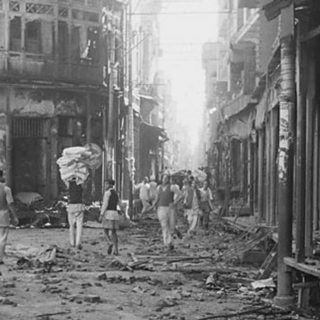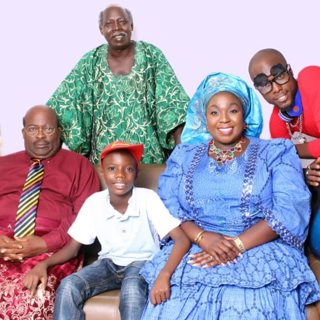
Seventy-five years since India's Partition
Max Pearson presents a compilation of stories marking 75 years since India's Partition. We'll hear the stories of people from both sides of the divide and find out about partition’s effect on the subcontinent’s diaspora.Also, the daughter of the last British Viceroy in India, Lord Mountbatten, remembers the transfer of power in 1947. Plus, we'll hear about the death of India's first Prime Minister Jawaharlal Nehru and how one of India’s greatest poets known as the ‘Bard of Bengal’, Rabindranath Tagore, became the first non-European to win a Nobel Prize for Literature.(Photo: Wrecked buildings after communal riots in Amritsar, Punjab, during the Partition of British India, March 1947. Credit: Getty Images)
20 Aug 202251min

The nightclub that changed Ibiza
Max Pearson introduces first-hand accounts of the nightclub that changed Ibiza, some of the worst forest fires in history, the resignation of Richard Nixon, discovering the Hale Bopp comet and Sweden’s pronoun battle.(Photo: Sunset over the sea in Ibiza with boats in the distance. Credit: BBC and Minnow Films)
13 Aug 202251min

Fifty years since Asians were kicked out of Uganda
Compilation of stories marking 50 years since Idi Amin expelled thousands of Asians from Uganda in 1972. We hear about why they migrated there, their expulsion, and what they did next.Jamie Govani’s grandparents always dreamed about finding a better life away from India. After getting married in the Indian state of Gujarat in the 1920s, they decided to pack their bags and move to Uganda with their young family. It was a wonderful place to grow up for Jamie, but racial segregation lingered in the background, and things began to change after Ugandan independence in 1962. She’s been speaking to Ben Henderson. As well as in Uganda, there was also an Asian population in Kenya, who experienced discrimination. This was initially from white settlers but, after independence, it came from black Kenyans too. Following the partition of India in 1947, Saleem Sheikh’s parents fled to Kenya. His family joined a thriving Asian community there. But, they were forced to leave in the late 1960s after a rise in violence against the Asian population. Saleem tells Ben Henderson about his life.In August 1972, the dictator Idi Amin announced that all Asians had just 90 days to leave Uganda. Nurdin Dawood, who was a teacher with a young family, initially didn't believe that Amin was being serious. But soon he was desperately searching for a country to call home. He spoke to his daughter Farhana Dawood in 2011. Thousands of Asians who were expelled from Uganda in 1972 settled in the UK and many made the city of Leicester their home. They helped to shape the east Midlands city’s identity with lots of new businesses. Now Leicester has the largest Diwali celebrations outside of India. Nisha Popat was nine-years-old when she arrived there with her family who later opened a restaurant in the area that became known as the Golden Mile. Nisha tells her story to Reena Stanton-Sharma. President Yoweri Museveni came to power in 1986. He encouraged exiled Asians to return to Uganda and reclaim their homes and businesses in order to rebuild the country. The economy had collapsed under the dictator Idi Amin. Dr. Mumtaz Kassam was one of the people who went back to Uganda years after arriving in the UK as a refugee. She talks to Reena Stanton-Sharma about returning to the country that had expelled her.(Picture of Jamie Govani's grandparents, aunts and uncles in Uganda in the 1950s)The following programme has been updated since its original broadcast.
6 Aug 202252min

The Revolution on Granite
A student protest in Ukraine, the Surkov leaks, the world’s deadliest ever earthquake, a leaflet bomber in South Africa and the invention of the nicotine patch.(Photo: Oksana Zabuzhko wearing a red jumper at the Revolution on Granite in 1990)
30 Juli 202251min

Stories from iconic TV shows from around the world
The history of television from around the world and its enduring impact, including a look at Nigeria's sitcom Papa Ajasco and an interview with actor turned food writer and Indian TV cook Madhur Jaffrey. Also we take you behind the scenes of telenovelas- Mexican soap operas and one of the most successful drama schools in Latin America The Centro de Educación Artística.
23 Juli 202251min

Stories from the abortion fight frontline
Stories from around the world on women's reproductive rights. Women fighting both sides of the abortion debate as well as the first Muslim country to legalise abortion. Also, the development of the Pill and why Japan took so long to make it legal for women.(Image: Speakers from Tunisia Women's Union at an event. Credit: Saida El Gueyed)
16 Juli 202249min

America’s first gay election candidate
In 1961 the first openly gay person ran for public office in the United States. He was a drag queen called Jose Sarria, well-known for his performances at the bohemian 'Black Cat' bar in San Francisco. He was determined to stop gay people being second-class citizens. His friend and fellow drag performer Mike-Michelle spoke to Josephine McDermott about his memories of the campaign.In 1928 the smear test was invented by Dr George Papanicoloau, a Greek immigrant who had made a new life in the United States. He discovered a way of detecting changes in cells from a woman’s cervix, which meant cancer could be prevented from developing. His work has stopped millions of women worldwide getting cancer. Dr Papanicolaou’s great niece Olga Stamatiou speaks to Laura Jones.It’s 10 years since scientists in Geneva said they believed they had found the Higgs Boson - known as the 'God particle'. In July 2012 after more than 40 years of searching, teams taking part in experiments at the Large Hadron Collider confirmed the existence of the particle which gives everything mass. Dr André David from CERN speaks to Laura Jones.In 1968 and early 1969 university students across Japan fought pitched battles with riot police after they barricaded themselves into their lecture halls and went on strike. They were protesting about the poor quality of their education and the inequalities of Japanese society in a period of rapid economic change. Emily Finch talks to Kazuki Kumamoto who was a young student who joined the protests. This is a Whistledown production for BBC World Service.The south-east region of Nigeria declared itself to be the independent state of Biafra. In response, Nigerian forces invaded the state on the 6th July 1967, beginning the Nigerian Civil War. More than a million people died before the fighting stopped. We bring you one child’s story of getting caught up in the frontline. In 2021 Paul Waters spoke to Patricia Ngozi Ebigwe, now better known as TV and music star Patti Boulaye, who was 13 years old when she had to try to escape the conflict.(Photo: Jose Sarria in drag. Credit: The Jose Sarria Foundation)
9 Juli 202250min

Hong Kong: 25 years since the handover from British to Chinese rule
Stories from Hong Kong, 25 years on since the handover from British to Chinese rule. We hear from the last governor of Hong Kong, a pro democracy campaigner and about life in Kowloon Walled City.(Photo: Chris Patten at the handover ceremony of Hong Kong from Britain to China. Credit: Getty Images)
2 Juli 202251min





















